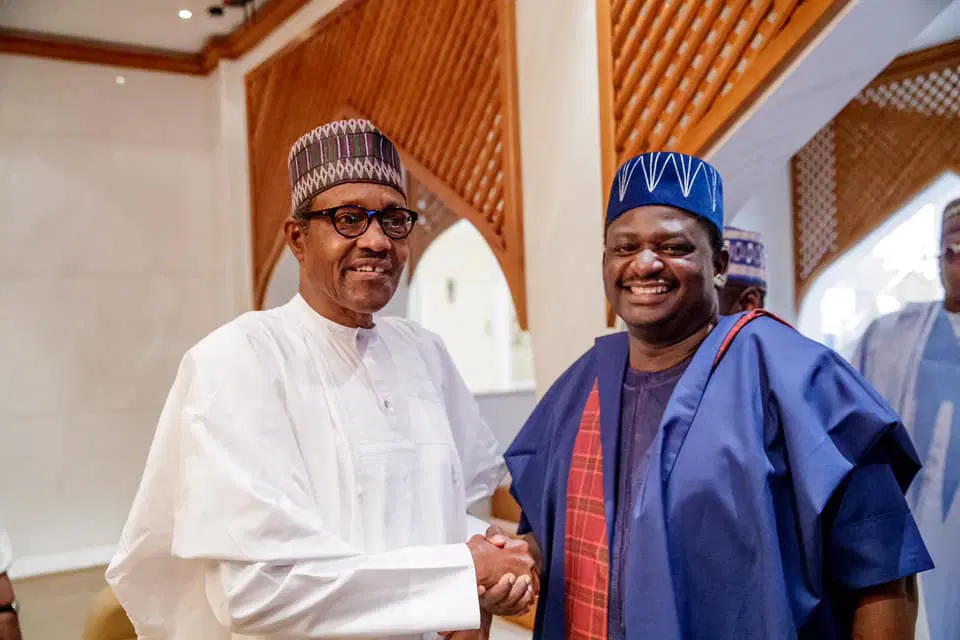Buhari’s medical treatment abroad has returned to the spotlight after he died in a London hospital, reigniting old debates about leadership, privilege, and the state of Nigeria’s healthcare system.
Former presidential spokesman Femi Adesina stirred fresh controversy when he defended the late ex-president Muhammadu Buhari’s choice to receive medical care in the UK throughout his presidency. Appearing on Channels Television during a special coverage of Buhari’s funeral, Adesina stated bluntly that Buhari might have “long been dead” had he relied solely on Nigerian hospitals.
“Buhari always had his medicals in London, even before he was elected in 2015,” Adesina said. “Those doctors already knew his medical history. It was about survival, not luxury.”
The former spokesman’s remarks come as Nigerians reflect on a presidency marked by frequent medical trips abroad. a pattern that, for many, symbolised both privilege and systemic failure. Critics argue that Buhari’s dependence on overseas treatment demonstrated a lack of faith in the very healthcare system he led for eight years.
Adesina, however, pushed back on that narrative. “One has to be alive first before making changes,” he said. “If Buhari had decided to stay and prove a point of patriotism, he might not have survived. The expertise simply wasn’t there.”
Beyond political commentary, Buhari’s death abroad has prompted renewed calls from religious and civil society leaders to address Nigeria’s enduring medical tourism problem. Catholic Archbishop of Lagos, Most Rev. Alfred Adewale Martins, described Buhari’s death as a tragic reminder of the deep cracks in the nation’s healthcare.
“It is a shame that the president of our country had to die in a hospital overseas,” Archbishop Martins said in a condolence message. “This should wake our leaders up to invest in health infrastructure and stop the brain drain that continues to impoverish healthcare delivery.”
Martins noted that while wealthy Nigerians and political elites can afford to fly abroad for treatment, millions of citizens are left behind in underfunded hospitals without adequate equipment or trained specialists. “They are left with the feeling that they are being left to die, even from the most easily treatable illnesses,” he added.
The debate on Buhari’s medical treatment abroad isn’t new. During his tenure, Buhari spent several months on medical leave in London, sparking protests back home and raising constitutional questions about presidential absence. The government offered few details on his exact condition, citing privacy, but each trip drew headlines and public frustration.
Many Nigerians see the late president’s medical choices as emblematic of a broader disconnect between leaders and the governed. While officials promise reforms, the reality for ordinary citizens remains long queues, poorly funded hospitals, and sometimes life-threatening delays.
Healthcare analysts also warn that Nigeria continues to lose medical talent to countries like the UK, Canada, and Saudi Arabia. With thousands of doctors emigrating yearly, local hospitals are often left understaffed, further worsening care quality.
Adesina, however, insisted that Buhari’s survival was tied directly to sticking with his trusted UK doctors. “It was a matter of professional expertise and continuity,” he argued, suggesting that changing doctors mid-treatment could have been fatal.
The former spokesman dismissed claims that these trips were acts of indifference to local healthcare. Instead, he framed them as pragmatic choices. “He needed to be alive to push the country toward building better health facilities,” Adesina said.
Yet, for many Nigerians, the conversation isn’t about the late president’s personal decisions but about decades of underinvestment that make medical tourism the only lifeline for the elite. As Buhari is laid to rest, his death abroad forces the country to confront a painful truth: until systemic reform happens, Buhari’s medical treatment abroad may remain the norm rather than the exception.
Whether this moment becomes a turning point or yet another forgotten headline depends largely on what leaders do next. and how urgently they prioritise healthcare for all, not just the privileged few.
Nigeria Mourns as Muhammadu Buhari Dies, Tinubu Declares National Honours

